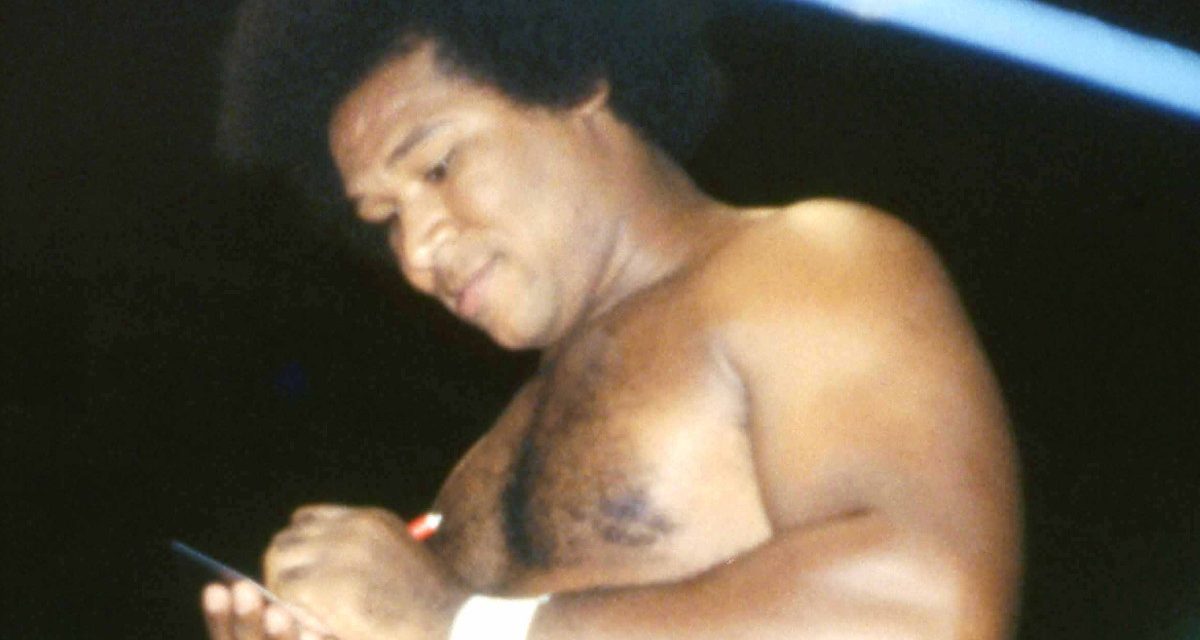To say that Tiger Conway Jr. was born to wrestle would be a major understatement; it was his dream. And although he may have given up on that dream too soon, it was all for the purpose of realizing an even bigger dream — starting a family.
“My oldest son was born in 1989. Then I had another one born in ’91 and my baby girl in ’94, so that kind of got me away from wrestling for a while,” Conway said.
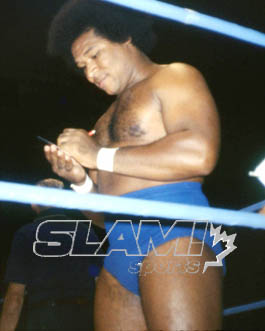
Tiger Conway Jr. signs autographs in the ring. Courtesy Chris Swisher
The wrestling business made Conway appreciate how important it was to be around family. And who better to instill those values in him than Conway’s own father, Tiger Conway Sr. (Plasee Conway, Sr.), a wrestler himself.
Conway (Plasee Dennis Conway Jr.) used to love going to work with his dad, not only because it brought the two of them closer together, but also because he was able to better understand why his dad did what he did for a living.
“As kids, we would always wonder when dad would arrive home. He owned a fencing company as well. He was a contractor,” Conway said. “It was really amazing to see some of the talent that he got to work with and how they worked the matches. I always wondered how they could do that and make it seem like it was real.”
Conway grew up in a small town in Houston. His father was quite popular at the time, which actually made him favoured by association. Conway loved that and always enjoyed hearing his dad’s stories. His father was a neighbourhood icon and Conway’s personal hero.
“We lived in a neighbourhood where everybody knew everybody else’s business, so when dad would wrestle, it created a bit of hype in the neighbourhood,” Conway said. “The neighbours used to come over and look at some of dad’s trophies and talk to him about wrestling. He acquired a lot of friends that way. Dad was very smart and had the gift of gab. He was able to do it from scratch.”
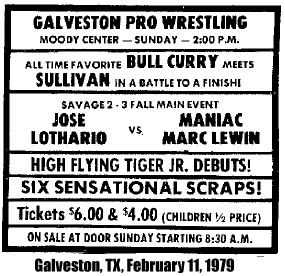
A debut in Galveston, Texas.
Conway never really got used to the idea of his dad being away so many days. But growing up in a wrestling household did have its perks as well.
“Sometimes after the events, some of the babyfaces would come over for dinner,” he said.
Occasionally Conway’s father would take him to work. He always loved seeing these larger-than-life superstars in front of him, but it was more important for him to spend time with his dad. He also remembers playing with some of the other wrestlers’ kids who were hanging around the locker room.
“I used to hang around with the Von Erich kids and the Blanchards. We all grew up around it. When we were in school, we all used to watch our fathers work and make trips with them. We all knew that we would be wrestlers, but we just didn’t know when or how soon,” Conway said. “I always knew that wrestling was supposed to be a work, not a shoot. But a lot of the wrestlers made it look so good. I would ask some of the guys that my dad knew why they did this and they all told me the same thing. They said they loved wrestling.”
Of course, spending so much time in an environment such as a wrestling arena eventually makes you a part of it. And Conway’s interest in wrestling was getting more and more serious. He decided that he wanted to train.
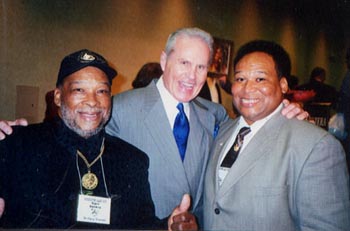
Tiger Conway Sr., Paul Diamond, and Tiger Conway Jr. at the Cauliflower Alley Club reunion in 2001. Photo by Rose Diamond.
“When I told dad I wanted to be a wrestler, he used to take me out and stretch me in the backyard. He always knew how far he was going to go, and eventually my mother had to come out and stop him. He would tell me that other guys are going to stretch me like that too. I played football back then, so I thought I was the king of the world. But wrestling’s a lot different than football,” Conway said. “I told my father that I wanted to have my own ring and I think that’s what did it and made him see that I was serious. He didn’t think I was ready. I was only 18 or 19 at the time and felt like I could be world champ already. I couldn’t, but I still felt like I could.”
Though he never really had any formal training, the 5-foot-11, 225-pound Conway was a very quick learner. He was able to pick things up just by watching how it was done, which is a skill that cannot be taught.
“I used to go to the arenas every Friday and I would watch every match. I would be listening to the boys in the locker room and listening to the finishes,” Conway said. “Then I would sneak out to the parking lot and watch them all leave with their families. I would pick it up as I went along. I ended up turning down a football scholarship and chose to wrestle. I trained for two years. I used to train with some of the wrestlers’ sons, who came with their dads. We would basically wrestle freestyle.”
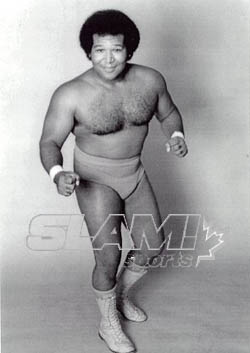
Tiger Conway Jr. Courtesy Chris Swisher
By the time he actually made his debut, Conway was well prepared for everything the wrestling business could possibly throw at him. But nothing could have prepared the business for what he would throw back.
“I started wrestling in 1971. After three months, I went into Bombay, India against the Indian champion,” Conway said. “It was more of a shoot style. There were rounds, and the ring was on sand, with a tarp over it. It was a 24-foot ring and the pace was slow, but I learned a lot from it.”
It seems like the closer Conway got to the nucleus of the wrestling business, he was met by a lot of unexpected surprises and also witnessed some serious altercations between some of the boys. But he always kept a straight face. He’s the kind of guy who would give the same greeting tomorrow as he would today. He really never spoke out of turn, but was always able to stand up for himself, when he felt that he was taken advantage of. And that may have earned him a lot of respect.
“Some of the boys used to get in a lot of fights back then. I remember Ole [Anderson] and [Blackjack] Mulligan used to get into real fisticuffs,” Conway said. “When I used to wrestle [Ric] Flair, he had a lot of personality. I would make him wooo! I thought he came out of [Verne] Gagne’s camp too early and he wasn’t ready yet. At the time, he was about 300 pounds and he couldn’t move real fast. I started the cauliflower ear. I know Wahoo [McDaniel] chopped Flair on every side of his body. Flair used to come up to me and say he just came from the doctor. He had to get his ear drained again and kept telling me not to hit the ear, but I would go after it anyway, because I knew that Flair would potato you whenever he got the chance.”
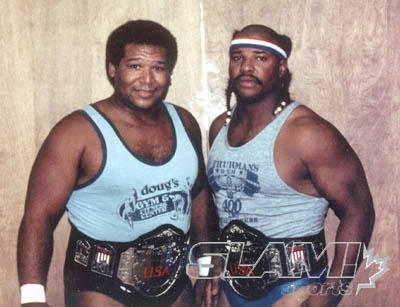
Tiger Conway Jr. and Iceman Parsons. Courtesy Chris Swisher
One of the most interesting things about the wrestling business is that everybody has a story to tell. They are all different, but equally entertaining. And Conway, who picked up his dad’s gift of gab, was more than willing to share one of his whoppers.
“I was partners at one time with Ronnie Garvin. There was one night where a couple of guys broke into my van and the alarm went off,” Conway said. “Ronnie and I caught up with them and beat those guys to a pulp. I told Ronnie to leave it alone, but he said he couldn’t stop. He said that he didn’t need to go to the gym that week, because it was enough of a workout. Then the police arrived and arrested them and Ronnie told them to take off the handcuffs, so he can beat them up again. They told him they’d have to arrest him if he didn’t stop.”
Ronnie Garvin, who was Conway’s tag team partner in Mid Atlantic Wrestling, remembers that story quite vividly.
“I went over to his house one day and he had an aquarium. So I was sitting there looking at the fish and drinking beer, and suddenly I heard this loud noise. Tiger’s van had an alarm, so when he heard the noise, he jumped up and started screaming, ‘My van!’ So we both went out the back and came around the house to the driveway. I went one way and he went the other way. He got there before I did and when I got there, there were a couple of guys in the van,” Garvin said. “By the time I got there, I saw that he had one guy’s head trapped in the window and he was punching him. I thought he was going to kill him. Then I saw one guy in the back window and I threw up my hands and shouted, ‘Freeze!’ He must have thought I had a gun or something. But I dragged him out and started beating his head against a hub cap. When the cops got there, they searched the car and found that there was a gun in the car. But we beat the dog shit out of these guys. They had to be taken to the hospital.”
Garvin didn’t get the nickname ‘rugged’ for no reason. He was a tough customer. But as tough as he was, he seems to have a soft spot for Conway and remembers his time as Conway’s partner as a very pleasurable experience.
“Every time we stopped by his place, his wife Nancy would always have food ready,” Garvin said. “Tiger was always a good guy. He was a fun guy and a good business guy.”
It may have been his dad who taught Conway to shoot, but Conway learned to work at his own pace.
“Tiger had a lot of talent, and his father was a heck of a guy,” wrote Bill Watts in The Cowboy and the Cross. “Tiger Jr. was a product of all the rebellion of the times. He had a big Afro and everything, but I always liked him and don’t remember ever having a problem with him. He was one of Paul Boesch’s stars in Houston, and when I went into business with Paul I had to integrate those guys into my stuff.”
Besides the wrestling end of things, Tiger Sr. started a fencing company in Houston, which his son now runs: Tiger Conway Jr. Fence And Construction Company.
Eventually, the WWE started taking notice of that work rate and started to give Conway a closer look.
“I went from the Mid South territory to Florida to Mid Atlantic and then to Southwest [San Antonio], so I was real polished by then. The WWF started buying all the territories and I was upset about that,” Conway said. “I was offered a chance to go to the WWF and I worked some matches with Jim Duggan, Kamala and Ted DiBiase. I put DiBiase over in Houston, and he was made on that one tape. He was over.”
It was around this time that DiBiase was about to be pushed to the moon as The Million Dollar Man. He doesn’t know Conway too well, but what he does remember of him is all positive.
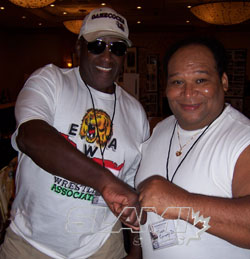
Sonny King and Tiger Conway Jr. at the 2010 Cauliflower Alley Club reunion. Photo by Mike Lano, WReaLano@aol.com
“I didn’t actually spend a lot of time with Tiger. But from what I do remember, he was a guy that was always very cordial,” DiBiase said. “Tiger and I both grew up in the industry, so I think we may have had greater respect for the business than those who were not born into it. We lived a similar lifestyle. I actually saw him at the CAC last year. He was never a guy who got in a lot of trouble and he wasn’t somebody who had a bad rep. Tiger’s a good guy.”
There is a common saying that as quickly as plans are made, plans will go awry. And unfortunately, Tiger’s deal with the WWE fell through, and he retired from professional wrestling in 1996. But there may have indeed been some light at the end of that tunnel, as Conway, now 58, is now a proud father and grandfather, which means more to him than anything ever could.
“If I die tonight, I would have accomplished all that I wanted to accomplish in life,” Conway said.
RELATED LINKS
- Nov. 14, 2006: Tiger Conway Sr. dead at 74
- Feb. 2, 2011: Minority Mat Report: The rocky road of African-Americans in wrestling
